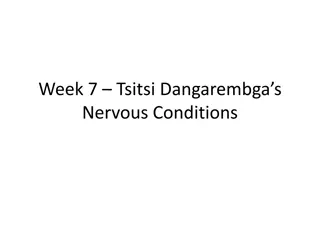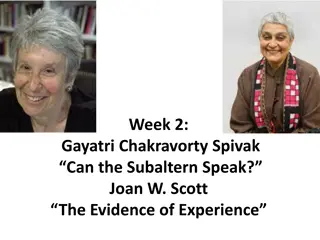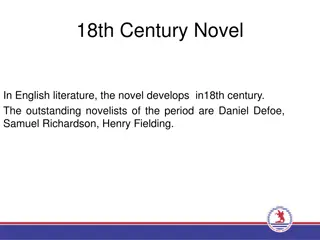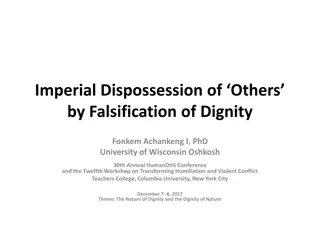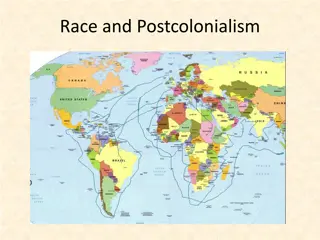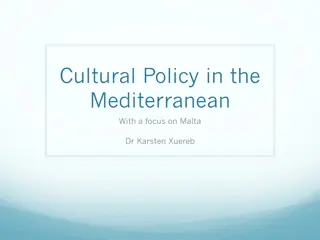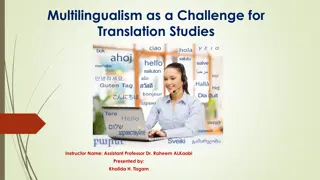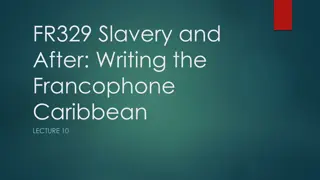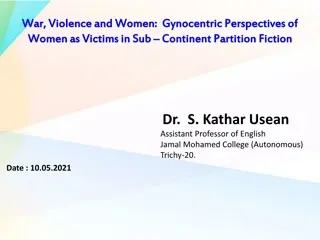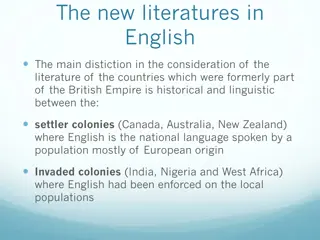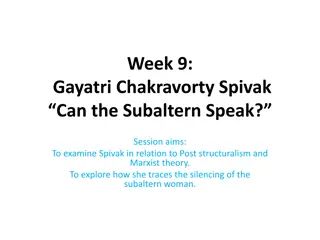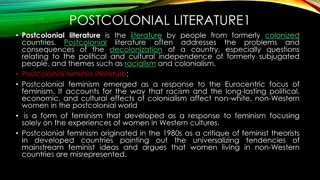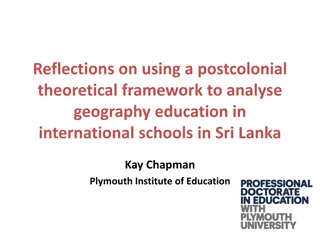Exploration of Gender and Sexuality in Tsitsi Dangarembga's "Nervous Conditions
Tsitsi Dangarembga's novel "Nervous Conditions" introduces a powerful narrative that focuses on the lives of young African girls and women in Zimbabwe during the postcolonial era. The novel challenges traditional gender roles and explores themes of sexuality, identity, and societal expectations. Thr
0 views • 11 slides
Critical Perspectives on Postcolonialism and Structuralism in Spivak's Work
Gayatri Chakravorty Spivak is known for her critical engagement with postcolonial theory and deconstruction, challenging traditional Western perspectives. By drawing on thinkers like Derrida and Foucault, Spivak offers a unique lens to interrogate power dynamics, hegemony, and resistance. Her work r
0 views • 31 slides
The Politics of Representation in Postcolonial Studies
An exploration of the power of texts, literary criticism, and Orientalism as discourse, focusing on Edward Said and Stuart Hall's contributions. The discussion delves into how texts shape our understanding of the world and the implications of Orientalist representations on the East. The analysis hig
0 views • 17 slides
Evolution of the 18th Century English Novel
The 18th century marked a significant evolution in English literature, particularly seen in the development of the novel. Key novelists of this period include Daniel Defoe, Samuel Richardson, and Henry Fielding. Their works, such as Robinson Crusoe, Pamela, and Tom Jones, epitomize the various style
0 views • 11 slides
Understanding Imperial Dispossession through Falsification of Dignity
Exploring the concept of imperial dispossession through the lens of falsification of dignity, this academic work delves into colonial and postcolonial theories to analyze how portraying Others as incomplete or imperfect perpetuates the cycle of dispossession. The discussion touches on the implicatio
0 views • 12 slides
Understanding Postcolonialism and Its Impact on Literature Studies
Postcolonial theory delves into the influence of colonialism on literature and academia, emphasizing the shift in national identities post-colonization. This theory examines the dynamics of power, resistance, and cultural dominance in the context of British colonial history, highlighting the reactio
0 views • 19 slides
Exploring Cultural Policy in the Mediterranean with a Focus on Malta
Delve into the intricate web of cultural relations in the Mediterranean region, centered around Malta. From historical and political insights to postcolonial influences and the role of cultural policy, this exploration sheds light on the complexities and nuances shaping the cultural landscape. Disco
0 views • 23 slides
The Impact of Multilingualism on Translation Studies
In a world embracing multilingualism, translators face new challenges when confronted with texts blending multiple languages. This phenomenon intertwines with translation, emphasizing the complex relationship between language, culture, and geography. Exploring literary multilingualism and its evolut
0 views • 24 slides
Complexity of Narrative Construction in Francophone Caribbean Literature
Exploring the intricacies of narrative construction in Francophone Caribbean literature, this lecture delves into the distinctions between fabula and syuzhet, the impact of authors' authority on storytelling, and the portrayal of Caribbean subjectivity and authority. Through examples from notable po
0 views • 11 slides
War, Violence, and Women in Subcontinent Partition Fiction: A Literary Analysis
This research work delves into the portrayal of gynocentric perspectives focusing on women as victims in the works of female novelists from South Asia regarding the India-Pakistan Partition and the Bangladesh War. The study examines six novels by authors such as Jyotirmoyee Devi, Attia Hosain, Mumta
0 views • 34 slides
The Evolution of Postcolonial Literature in English
The exploration delves into the evolution of postcolonial literature in English, contrasting the experiences of settler colonies and invaded colonies in adopting and adapting the English language. It discusses the impact of historical impositions and themes of identity, exile, and displacement acros
0 views • 15 slides
Reimagining Theoretical Boundaries: Spivak's Critical Perspectives
Gayatri Chakravorty Spivak challenges traditional categories by constantly revising her critical theories in response to societal changes. She explores the silencing of subaltern women, drawing on post-structuralist and Marxist ideas to question Western imperialism. Spivak's work reflects a dynamic
0 views • 26 slides
Exploring Postcolonial Feminist Literature in Former Colonized Societies
Postcolonial feminist literature emerged in response to the Eurocentric focus of feminism, highlighting the impact of racism and colonialism on non-Western women's experiences. Postcolonial societies navigate shifts in gender roles post-colonization, facing challenges of identity, double consciousne
0 views • 9 slides
Postcolonial Research in Geography Education: Methodology and Inquiry in Sri Lanka
Exploring postcolonial perspectives in geography education at British international schools in Sri Lanka. Investigating the impact of Western ethnocentric curriculum and international knowledge sharing on educational discourses and Othering practices. Research aims to analyze the production of geogr
0 views • 11 slides
Exploring Postcolonial Perspectives in Geography Education in Sri Lankan International Schools
Analysis of geography education in British international schools in Sri Lanka using a postcolonial theoretical framework to examine power dynamics, knowledge construction, and cultural representations. Focus on the impact of British English education as a marker of social status in Sri Lankan societ
0 views • 10 slides
